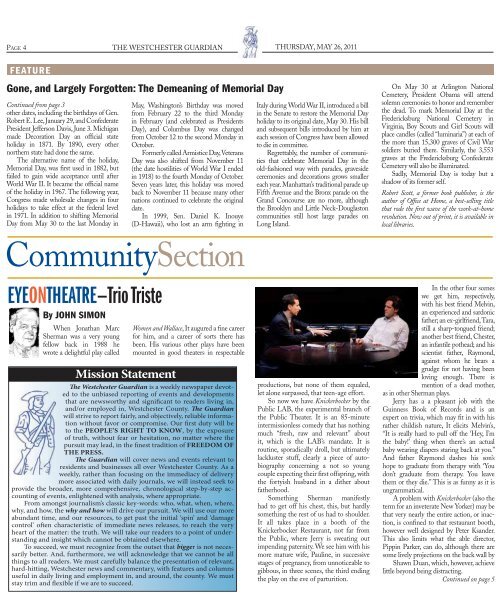Westchester County Executive Rob Astorino Fooled Us ... - Typepad
Westchester County Executive Rob Astorino Fooled Us ... - Typepad
Westchester County Executive Rob Astorino Fooled Us ... - Typepad
Create successful ePaper yourself
Turn your PDF publications into a flip-book with our unique Google optimized e-Paper software.
PAGE 4 THE WESTCHESTER GUARDIAN THURSDAY, MAY 26, 2011<br />
FEATURE<br />
Gone, and Largely Forgotten: The Demeaning of Memorial Day<br />
Continued from page 3<br />
other dates, including the birthdays of Gen.<br />
<strong>Rob</strong>ert E. Lee, January 29, and Confederate<br />
President Jefferson Davis, June 3. Michigan<br />
made Decoration Day an official state<br />
holiday in 1871. By 1890, every other<br />
northern state had done the same.<br />
The alternative name of the holiday,<br />
Memorial Day, was first used in 1882, but<br />
failed to gain wide acceptance until after<br />
World War II. It became the official name<br />
of the holiday in 1967. The following year,<br />
Congress made wholesale changes in four<br />
holidays to take effect at the federal level<br />
in 1971. In addition to shifting Memorial<br />
Day from May 30 to the last Monday in<br />
May, Washington’s Birthday was moved<br />
from February 22 to the third Monday<br />
in February (and celebrated as Presidents<br />
Day), and Columbus Day was changed<br />
from October 12 to the second Monday in<br />
October.<br />
Formerly called Armistice Day, Veterans<br />
Day was also shifted from November 11<br />
(the date hostilities of World War I ended<br />
in 1918) to the fourth Monday of October.<br />
Seven years later, this holiday was moved<br />
back to November 11 because many other<br />
nations continued to celebrate the original<br />
date.<br />
In 1999, Sen. Daniel K. Inouye<br />
(D-Hawaii), who lost an arm fighting in<br />
Italy during World War II, introduced a bill<br />
in the Senate to restore the Memorial Day<br />
holiday to its original date, May 30. His bill<br />
and subsequent bills introduced by him at<br />
each session of Congress have been allowed<br />
to die in committee.<br />
Regrettably, the number of communities<br />
that celebrate Memorial Day in the<br />
old-fashioned way with parades, graveside<br />
ceremonies and decorations grows smaller<br />
each year. Manhattan’s traditional parade up<br />
Fifth Avenue and the Bronx parade on the<br />
Grand Concourse are no more, although<br />
the Brooklyn and Little Neck-Douglaston<br />
communities still host large parades on<br />
Long Island.<br />
On May 30 at Arlington National<br />
Cemetery, President Obama will attend<br />
solemn ceremonies to honor and remember<br />
the dead. To mark Memorial Day at the<br />
Fredericksburg National Cemetery in<br />
Virginia, Boy Scouts and Girl Scouts will<br />
place candles (called “luminaria”) at each of<br />
the more than 15,300 graves of Civil War<br />
soldiers buried there. Similarly, the 3,553<br />
graves at the Fredericksburg Confederate<br />
Cemetery will also be illuminated.<br />
Sadly, Memorial Day is today but a<br />
shadow of its former self.<br />
<strong>Rob</strong>ert Scott, a former book publisher, is the<br />
author of Office at Home, a best-selling title<br />
that rode the first wave of the work-at-home<br />
revolution. Now out of print, it is available in<br />
local libraries.<br />
CommunitySection<br />
EYEONTHEATRE—Trio Triste<br />
By JOHN SIMON<br />
When Jonathan Marc<br />
Sherman was a very young<br />
fellow back in 1988 he<br />
wrote a delightful play called<br />
Mission Statement<br />
Women and Wallace, It augured a fine career<br />
for him, and a career of sorts there has<br />
been. His various other plays have been<br />
mounted in good theaters in respectable<br />
The <strong>Westchester</strong> Guardian is a weekly newspaper devoted<br />
to the unbiased reporting of events and developments<br />
that are newsworthy and significant to readers living in,<br />
and/or employed in, <strong>Westchester</strong> <strong>County</strong>. The Guardian<br />
will strive to report fairly, and objectively, reliable information<br />
without favor or compromise. Our first duty will be<br />
to the PEOPLE’S RIGHT TO KNOW, by the exposure<br />
of truth, without fear or hesitation, no matter where the<br />
pursuit may lead, in the finest tradition of FREEDOM OF<br />
THE PRESS.<br />
The Guardian will cover news and events relevant to<br />
residents and businesses all over <strong>Westchester</strong> <strong>County</strong>. As a<br />
weekly, rather than focusing on the immediacy of delivery<br />
more associated with daily journals, we will instead seek to<br />
provide the broader, more comprehensive, chronological step-by-step accounting<br />
of events, enlightened with analysis, where appropriate.<br />
From amongst journalism’s classic key-words: who, what, when, where,<br />
why, and how, the why and how will drive our pursuit. We will use our more<br />
abundant time, and our resources, to get past the initial ‘spin’ and ‘damage<br />
control’ often characteristic of immediate news releases, to reach the very<br />
heart of the matter: the truth. We will take our readers to a point of understanding<br />
and insight which cannot be obtained elsewhere.<br />
To succeed, we must recognize from the outset that bigger is not necessarily<br />
better. And, furthermore, we will acknowledge that we cannot be all<br />
things to all readers. We must carefully balance the presentation of relevant,<br />
hard-hitting, <strong>Westchester</strong> news and commentary, with features and columns<br />
useful in daily living and employment in, and around, the county. We must<br />
stay trim and flexible if we are to succeed.<br />
productions, but none of them equaled,<br />
let alone surpassed, that teen-age effort.<br />
So now we have Knickerbocker by the<br />
Public LAB, the experimental branch of<br />
the Public Theater. It is an 85-minute<br />
intermissionless comedy that has nothing<br />
much “fresh, raw and relevant” about<br />
it, which is the LAB’s mandate. It is<br />
routine, sporadically droll, but ultimately<br />
lackluster stuff, clearly a piece of autobiography<br />
concerning a not so young<br />
couple expecting their first offspring, with<br />
the fortyish husband in a dither about<br />
fatherhood.<br />
Something Sherman manifestly<br />
had to get off his chest, this, but hardly<br />
something the rest of us had to shoulder.<br />
It all takes place in a booth of the<br />
Knickerbocker Restaurant, not far from<br />
the Public, where Jerry is sweating out<br />
impending paternity. We see him with his<br />
more mature wife, Pauline, in successive<br />
stages of pregnancy, from unnoticeable to<br />
gibbous, in three scenes, the third ending<br />
the play on the eve of parturition.<br />
In the other four scenes<br />
we get him, respectively,<br />
with his best friend Melvin,<br />
an experienced and sardonic<br />
father; an ex-girlfriend, Tara,<br />
still a sharp-tongued friend;<br />
another best friend, Chester,<br />
an infantile pothead; and his<br />
scientist father, Raymond,<br />
against whom he bears a<br />
grudge for not having been<br />
loving enough. There is<br />
mention of a dead mother,<br />
as in other Sherman plays.<br />
Jerry has a a pleasant job with the<br />
Guinness Book of Records and is an<br />
expert on trivia, which may fit in with his<br />
rather childish nature, It elicits Melvin’s,<br />
“It is really hard to pull off the ‘Hey, I’m<br />
the baby!’ thing when there’s an actual<br />
baby wearing diapers staring back at you.”<br />
And father Raymond dashes his son’s<br />
hope to graduate from therapy with ‘You<br />
don’t graduate from therapy. You leave<br />
them or they die.” This is as funny as it is<br />
ungrammatical.<br />
A problem with Knickerbocker (also the<br />
term for an inveterate New Yorker) may be<br />
that very nearly the entire action, or inaction,<br />
is confined to that restaurant booth,<br />
however well designed by Peter Ksander.<br />
This also limits what the able director,<br />
Pippin Parker, can do, although there are<br />
some lively projections on the back wall by<br />
Shawn Duan, which, however, achieve<br />
little beyond being distracting.<br />
Continued on page 5














